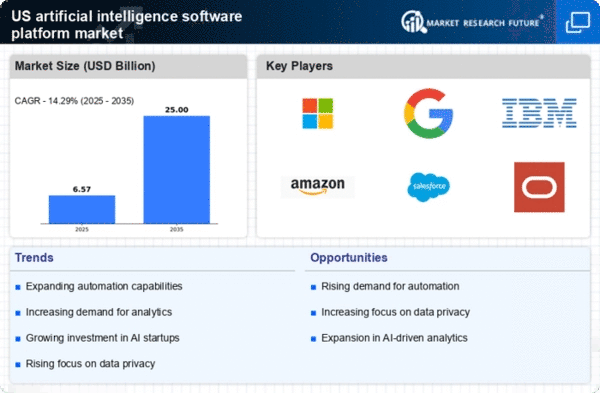Growing Demand for Automation
the artificial intelligence-software-platform market is experiencing a notable surge in demand for automation across various sectors.. Businesses are increasingly seeking to streamline operations, reduce costs, and enhance efficiency through AI-driven solutions. According to recent data, the automation market is projected to grow at a CAGR of approximately 25% over the next five years. This trend indicates a robust appetite for AI technologies that can automate repetitive tasks, thereby allowing human resources to focus on more strategic initiatives. As organizations recognize the potential of AI to transform workflows, the artificial intelligence-software-platform market is likely to expand, driven by the need for innovative automation solutions..
Rising Investment in AI Startups
Investment in AI startups is a critical driver of growth within the artificial intelligence-software-platform market. Venture capital funding for AI-related companies has surged, with investments reaching over $30 billion in the past year alone. This influx of capital fosters innovation and accelerates the development of new AI technologies and platforms. As startups introduce disruptive solutions, established companies are compelled to adapt and integrate these advancements into their operations. This dynamic investment landscape suggests that the artificial intelligence-software-platform market will continue to thrive, as new entrants bring fresh ideas and technologies to the forefront.
Regulatory Support for AI Development
Regulatory support for artificial intelligence development plays a pivotal role in shaping the artificial intelligence-software-platform market. Government initiatives aimed at fostering AI innovation and ensuring ethical practices are becoming increasingly prevalent. For example, recent policies have been introduced to promote research and development in AI technologies, providing funding and resources to organizations. This regulatory environment encourages businesses to invest in AI solutions, knowing that they are supported by favorable policies. As a result, the market is likely to benefit from this supportive framework, leading to accelerated growth and adoption of AI technologies..
Integration of AI in Business Intelligence
the integration of artificial intelligence into business intelligence tools is reshaping the market.. Companies are leveraging AI to gain deeper insights from their data, enabling more informed decision-making. Recent studies indicate that organizations utilizing AI-driven business intelligence solutions can improve their operational efficiency by up to 30%. This integration allows for predictive analytics, trend analysis, and enhanced reporting capabilities, which are crucial for maintaining a competitive edge. As businesses increasingly adopt AI technologies for data analysis, the market is poised for substantial growth, driven by the demand for advanced business intelligence solutions..
Advancements in Machine Learning Algorithms
the artificial intelligence-software-platform market is influenced by advancements in machine learning algorithms.. These innovations enhance the capabilities of AI systems, enabling them to process vast amounts of data with greater accuracy and speed. For instance, the introduction of deep learning techniques has revolutionized image and speech recognition, making AI applications more effective in real-world scenarios. As organizations increasingly rely on data-driven decision-making, the demand for sophisticated machine learning algorithms is expected to rise. This trend suggests that the artificial intelligence-software-platform market will continue to evolve, driven by the need for more powerful and efficient AI solutions.
















